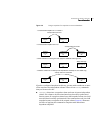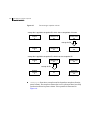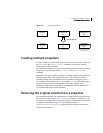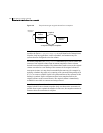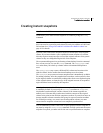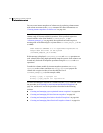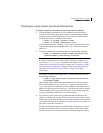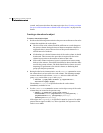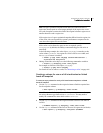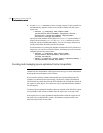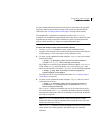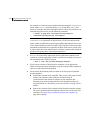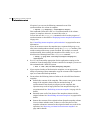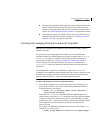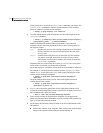
323Administering volume snapshots
Creating instant snapshots
Note: All space-optimized snapshots that share the cache must have a
region size that is equal to or an integer multiple of the region size set on
the cache. Snapshot creation also fails if the original volume’s region size is
smaller than the cache’s region size.
If the region size of a space-optimized snapshot differs from the region size
of the cache, this can degrade the system’s performance compared to the
case where the region sizes are the same.
If the cache is to be allowed to grow in size as required, specify
autogrow=on. By default, the ability to automatically grow the cache is
turned off.
In the following example, the cache object, cobjmydg, is created over the
cache volume, cachevol, the region size of the cache is set to 32KB, and
the autogrow feature is enabled:
# vxmake -g mydg cache cobjmydg cachevolname=cachevol \
regionsize=32k autogrow=on
4 Having created the cache object, use the following command to enable it:
# vxcache [-g diskgroup] start cache_object
For example to start the cache object, cobjmydg:
# vxcache -g mydg start cobjmydg
For details of how to remove a cache, see “Removing a cache” on page 347.
Creating a volume for use as a full-sized instant or linked
break-off snapshot
To create an empty volume for use by a full-sized instant snapshot or a linked
break-off snapshot
1 Use the
vxprint command on the original volume to find the required size
for the snapshot volume.
# LEN=‘vxprint [-g diskgroup] -F%len volume‘
Note: The command shown in this and subsequent steps assumes that you
are using a Bourne-type shell such as
sh, ksh or bash. You may need to
modify the command for other shells such as csh or tcsh.
2 Use the
vxprint command on the original volume to discover the name of
its DCO:
# DCONAME=‘vxprint [-g diskgroup] -F%dco_name volume‘
3 Use the vxprint command on the DCO to discover its region size (in blocks):
# RSZ=‘vxprint [-g diskgroup] -F%regionsz $DCONAME‘



